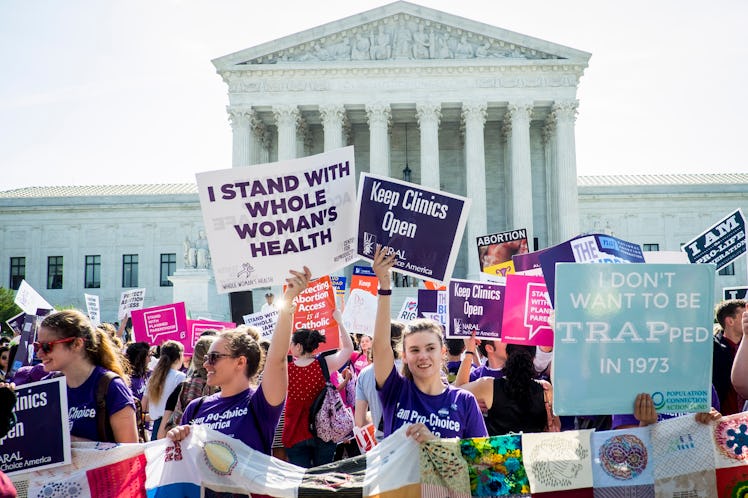
The Supreme Court Isn't The Only Hope For Reproductive Rights, So Don't Panic Yet
The recent announcement that Supreme Court Justice Anthony Kennedy would be stepping down come July 31 has everyone wondering about the future of women's reproductive health. This justice's departure means that Donald Trump will have his second pick for who will fill a Supreme Court seat, which might mean bad news for pro-choice advocates since the president has promised to appoint anti-abortion judges. So, what happens if Roe v. Wade is overturned? Don't worry, there's still some hope for women's rights.
In 1973, Roe v. Wade guaranteed women across the country the right to an abortion under the Fourteenth Amendment's right to privacy, but it only standardized on a federal level what some states had already enshrined in law. As awful as it would be, if Roe v. Wade were overturned, states could still enact legislation on a state level that would protect women's rights to access abortion services within their borders. So, even if (and this is worst case scenario people) Roe v. Wade is overturned, women in certain states would still see their rights protected. For example, women who live in California, Connecticut, Delaware, Hawaii, Maine, Maryland, Nevada, and Washington likely wouldn't have to fear for the future of their reproductive health, since these states have laws that protect a woman's right to abortions even if Roe v. Wade is overturned.
However, that might also mean bad news depending on what state you call home, because some states' legislatures are very much against abortion rights. States such as Louisiana, Mississippi, North Dakota, and South Dakota have already passed laws that would automatically ban abortions if the case is overturned. In March, Republicans in Mississippi proposed a 15-week abortion ban as a test to Roe v. Wade. In addition, the proposed bill wouldn't include exceptions for rape or incest. Welcome to a real life Handmaid's Tale, everyone.
The idea of state-by-state differences in your rights to bodily autonomy isn't new. Prior to Roe v. Wade passing, some states, Colorado being the first, decriminalized abortions in cases of rape, incest, or whether the pregnancy would harm the woman. In 1970, Hawaii became the first state that allowed legal abortions at the request of the woman. New York quickly followed suit, allowing abortions up to 24 weeks of pregnancy.
The journey towards women having the rights to make decisions over their bodies has been a long and exhausting one, and it looks like it might get even harder with a change to the Supreme Court.
Although appointed by the Republican Party, Justice Kennedy earned himself a reputation for not sticking to ideological borders on social issues. Not only was he was the swing vote in 1992's Planned Parenthood v. Casey, another abortion rights case which affirmed Roe v. Wade in a historic decision, but he was also a key figure in passing other progressive cases such as Obergefell v. Hodges in 2015 — which legalized same-sex marriage.
Throughout his 2016 presidential campaign, Trump openly admitted that he plans to nominate judges that would help overturn Roe v. Wade. Following Kennedy's resignation, Ilyse Hogue, president of NARAL Pro-Choice America, said in a statement shared with Elite Daily that she fears for the future of women's reproductive rights.
She said,
Today, Justice Kennedy announced his retirement, and because President Trump will nominate the next Supreme Court Justice, a woman’s constitutional right to access legal abortion is in dire, immediate danger—along with the fundamental rights of all Americans. We also know that for decades, a multi-million-dollar, extreme, anti-choice movement has quietly and aggressively chipped away at that right in state legislatures, in lower courts, and now from within the Trump administration. Their stated goal, clearly and loudly, is overturning Roe v. Wade. Our country faces a moment of deep crisis—a crisis of rights, of values, and of leadership. The deeply-divided decisions from the Supreme Court this week are a clear warning that our most cherished values are in jeopardy, and now hang in the balance. Women will not go back to the days when abortion was illegal in this country.
Even though this may feel like an award winning dystopian television series, let's not forget that this is reality. For those looking to stand up for a cause, here's how to help fight for women's reproductive rights. It can be done.